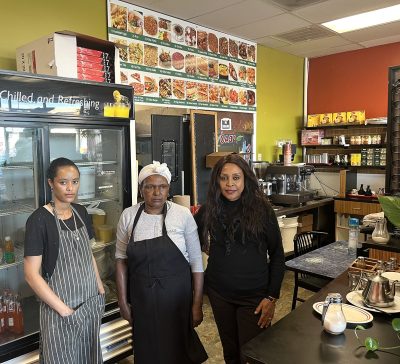
Shy cooks Tumti Aleme & Yesui Asnakau; owner Suzani Grant, right
No one comes to Horn Of Africa Deli for the ambience. There’s hardly any — in contrast to its sister restaurant, the lushly decorated Lucy Ethiopian Restaurant And Lounge a mile away.
At Lucy, Suzani Grant, who owns both restaurants, beguiles diners with descriptions of the history infusing her native cuisine and plates frame the traditional dishes.
At Horn of Africa, in the Gulfton Area Management District, there are no plates. All dishes are carryout, ordered from a huge grid of photos with laconic English labels: “beef tips,” “lamb tips,” “fish curry” – without prices or further detail.
Yesui Asnakau, one of the deli’s cooks, spends most of her time in the back, smoothing a flour-smudged apron as she indicates she speaks almost no English. Instead of art, walls of storage sacks dominate the tiny space: cardboard sacks of brown teff flour and burlap bags of fresh green coffee beans from Ethiopia.
A few blue tabletops, one with a crumpled napkin and forgotten Sprite bottle, offered diners the first welcome one recent day.
But few customers plan to stay. Most are people from Ethiopia who come for fresh-cooked meals to go, and, most often, for what some call is the best injera in Houston.
“They’re famous for it,” said Ethiopian truck driver ChiChi ChiChi (his real name – it’s on his driver’s license). “The injera is the reason I stop here. The cook came from Ethiopia and she didn’t forget how to make it.”
Injera — a round, flat, staple bread that is what tortillas are to Mexican food, appears at almost every Ethiopian meal. It’s exceptionally time-consuming to make, ChiChi said, and even harder to do it as well as the version at Horn of Africa.
Typically, he said, injera takes two or three days to make.: That’s how long the teff batter needs to ferment, giving the big, round bread its faintly tangy taste and much-loved dimpled surface.
At Horn of Africa, he said after exchanging a few words with Asnakau, the batter is fermented even longer, up to five days.
Soon after this explanation, Asnakau emerges from the kitchen with a round plastic container of “lamb tips” and a Styrofoam box containing a freshly made injera folded in quarters like a tablecloth.
Her injera is indeed mouth-watering – perfectly fresh and so flavorful and springy that it manages to rob attention from the deeply seasoned stew of goat, onion crescents, green peppers and red palm oil.
“This injera keeps longer, too,” ChiChi said. “Because of the long fermenting time, it is as delicious three or four days after I buy it.”
The flavor deepens, too, becoming tart and almost intoxicating, like excellent sourdough.
But injera is only one of many Ethiopian dishes at Horn of Africa that showcase the immense expertise of traditional cooks. Even simple lentils can take over an hour because of the many spices they need, ChiChi said wistfully.
Back home in Ethiopia, where he just visited, his wife cooks this way for their two children. On his own in Houston, where he works to support them, dinner means throwing lentils and onions in a pot and making do with mediocrity.
“If you want fast food,” he said, “don’t go to get Ethiopian food. It takes so much work.”
That’s why ChiChi indulges himself by getting very best injera he can find.
Although Asnakau has been here for seven years, she said as ChiChi interpreted, she still spends all the time necessary to cook each dish exactly as she was raised to do it at home.
With such a big menu, it might stand to reason that Horn of Africa serves a family or village favorite that Asnakau has refined into her signature.
She laughed softly, smoothed her apron and stood straight.
“Everything that we make here is beautiful,” she said.
5930 Renwick Dr. Suite B, Houston
713-838-1111
Open daily
— by Claudia Kolker






